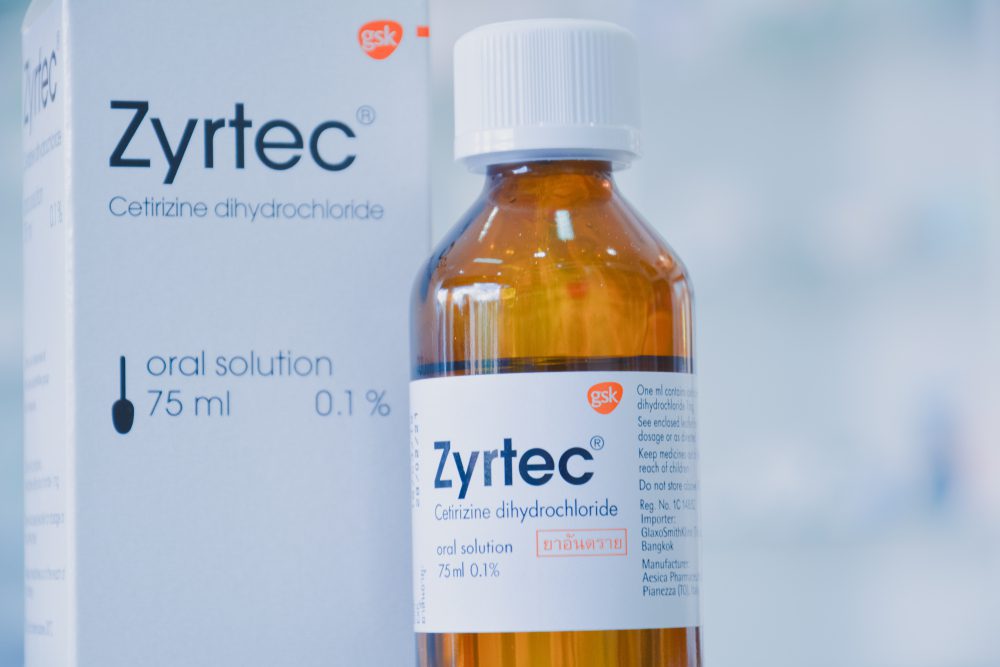Zyrtec for Dogs: A Useful Tool in the Fight Against Allergies

Table of Contents
Luckily, Zyrtec can be used in dogs. Plus, as a second-generation antihistamine, it does not cause drowsiness, and pets do not grow a tolerance to its active ingredient when used long-term.
Keep reading to learn more about Zyrtec for dogs and see whether cetirizine is a beneficial addition to your dog’s allergy management plan.
Can I Give My Dog Zyrtec?

Yes, you can give your dog Zyrtec. In fact, Zyrtec is one of the safest over-the-counter medications for dogs. It is an excellent first-aid choice and has wide safety margins – it is not likely to cause any issues even if given in large doses.
Zyrtec is the brand name for the antihistamine cetirizine hydrochloride. In veterinary medicine, Zyrtec is used off-label, meaning although safe, it is not FDA approved for use in pets. However, vets support the Zyrtec use in dogs because it is beneficial, inexpensive, and readily available.
Zyrtec is popularly known as an improved Benadryl version. This is because, unlike Benadryl, the active ingredient in Zyrtec (cetirizine) does not cause sedation and lethargy. This is due to the fact that cetirizine does not cross the blood-brain barrier.
When to Use Zyrtec for Dogs
Zyrtec is used for controlling allergic reactions in dogs. Allergy management in dogs is critical because in more severe cases, the allergic reaction may trigger hives or, worst-case scenario, a potentially life-threatening condition known as anaphylactic shock.
Even when not life-threatening, allergic reactions are tedious. The irritation and excessive itching can lead to secondary skin infections, hair loss, and other complications.
To understand how Zyrtec works we need to explain how allergic reactions occur. Namely, during an allergic reaction, the body releases a chemical known as histamine. Once released, the histamine binds with the so-called H1 receptors, which results in itchiness and swelling. Zyrtec and all antihistamines for dogs work by blocking the histamine receptors in the dog’s body.
Benefits and Uses of Zyrtec for Dogs

Zyrtec is a second-generation antihistamine that brings more benefits and fewer side effects. Let’s take a closer look at the benefits and uses of Zyrtec for dogs.
Zyrtec for Atopic Dermatitis. Cetirizine is a useful medication for dogs with atopic dermatitis. According to a study, Zyrtec can help relieve excessive itchiness in 18% of dogs. Plus, side effects (vomiting) were reported in only two dogs.
Zyrtec for Allergy Management. A study comparing the effects of diphenhydramine and cetirizine found out that Zyrtec is more efficient in managing the body’s immune response and combating allergy symptoms than Benadryl.
Zyrtec for Bug Bites and Stings. In a study, giving dogs cetirizine before injecting them with histamine resulted in lesser local inflammation and allergic reaction. This feature can be used in dogs with insects bites and stings.
Potential Side Effects and Risks of Zyrtec for Dogs
All antihistamines are considered to be generally safe for dogs. However, medications have the potential to trigger some side effects in certain overly sensitive individuals. In those terms, the side effects associated with Zyrtec include:
- Vomiting and/or diarrhea
- Excessive salivation
- Hyperactivity
- Impulsiveness
- Urine retention
- Constipation
As already mentioned, the main side effect of antihistamines – drowsiness is not common in dogs receiving Zyrtec. However, if a small dog is dosed with a significant Zyrtec amount, it may become sedated and lethargic.
Zyrtec should be used with extra caution on dogs with:
- Chronic heart, kidney, and liver problems
- Seizure disorders and thyroid conditions
- Prostatic enlargement and glaucoma
- Trouble urinating or constipation issues
- Puppies, seniors, pregnant, and nursing females
On the other hand, Zyrtec must not be used in dogs:
- Allergic or sensitive to the active ingredient or hydroxyzine
- Receiving other medications with known drug interactions
- Working dogs prone to sleepiness as a side effect
Finally, we should emphasize an important precaution – never give your dog Zyrtec-D. This formula’s main active ingredient is the same as in regular Zyrtec. However, Zyrtec-D contains another compound called pseudoephedrine (120mg/tablet).
In humans, pseudoephedrine helps with congestion, but in pets, it overstimulates the central nervous system and the heart, resulting in potentially life-threatening seizures and heart failure. Therefore, Zyrtec-D is considered to be toxic to dogs.
Zyrtec Dosage for Dogs
The exact Zyrtec dosage depends on the dog’s size and the underlying cause for using the medication in the first place. Here are the basic dosing guidelines:
- For Atopic Dermatitis – 0.5 mg per pound of body weight every 24 hours
- For Allergy Symptoms – 0.5 mg per pound of body weight every 12 hours
- For Insect Bites/Stings – 0.5 mg per pound of body weight as first-aid
Zyrtec is available as tablets (5mg and 10mg) and an oral syrup. Which Zyrtec form you will choose depends on your dog’s size and dosage needs. In general, if you have a smaller dog, the liquid form would be more practical because the tablets are very small and hard to cut. On the other hand, if your dog is a large or giant breed, the 10 mg tablets are more convenient.
The Zyrtec tablets can be given with or without food. The general rule of the thumb is to avoid giving dogs pills on an empty stomach if prone to digestive issues (vomits or has dog diarrhea). As for the Zyrtec syrup, it can be drizzled on top of the dog’s food or squirted directly into the dog’s mouth.
If you accidentally forgot to give your dog its regular Zyrtec dose, you have two options:
- Skip the missed dose completely (recommended when dosing twice per day)
- Give the missed dose as soon as you remember (recommended when using Zyrtec once a day)
In both cases, it is important not to “double-up” to compensate for the missed dose. Although antihistamine overdoses are practically impossible, sticking to the dosing guidelines is of imperative importance.
Zyrtec for Dogs Usage Guidelines

Zyrtec is a relatively fast-acting medication that starts working within an hour or two of the administration. Plus, it is completely eliminated from the body after 24 hours. However, the elimination period might be longer in dogs with liver or kidney disease.
The active ingredient in Zyrtec can interact with other medications. Common drug interactions involve:
- Anti-anxiety medications (diazepam, alprazolam, lorazepam)
- Muscle relaxants (carisoprodol, andcyclobenzaprine)
- Opioids (morphine, codeine, hydrocodone)
- Heart and blood pressure medications (digoxin)
- Other antihistamines (chlorpheniramine, diphenhydramine)
To avoid unwanted interactions, it is advisable to consult with your veterinarian before giving Zyrtec. It is also important to inform the vet about any supplements and herbal therapies your dog is receiving.
If Zyrtec is not the perfect fit for your dog’s condition, ask the vet about other antihistamines such as Diphenhydramine (Benadryl) or Loratadine (Claritin). Vets Preferred Premium Wild Alaskan is also a good over the counter alternative to stop your dog’s itching. It helps relieve dry, itchy skin while also moisturizing and soothing their skin from the inside out. This Vets Preferred product is perfect for dogs struggling with seasonal allergies and acts as a natural anti-inflammatory.
If you prefer a more natural management approach, CBD oil for dogs is a great holistic option. CBD oil can help dogs with allergies on various levels – from modulating the immune system and preventing overreactions to alleviating the itchiness and other allergy symptoms. We suggest using the Honest Paws CBD products (oil, treat chews, and peanut butter).
All Honest Paws CBD products are made of organic, human-grade, and full-spectrum hemp. Plus, they are enriched with additional health-boosting ingredients and feature dog-friendly flavors.
In addition to CBD products, dogs with allergies can benefit from omega-3 fatty acids. The best source of omega-3 for dogs is fish oil made of wild-caught, cold-water fish like salmon.
Our Final Thoughts on Zyrtec for Dogs
Remember, an itchy life is not a pleasant one. If your dog is constantly itching, biting, and gnawing, it means they are suffering. As a responsible pet owner, you want to do everything in your power to relieve its allergic reaction.
Zyrtec for dogs has a proven track record for treating dogs suffering from allergic issues. Help your dog by easing their itch and giving those scratching legs a break by investing in Zyrtec today.
















